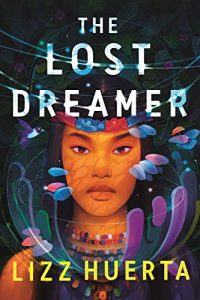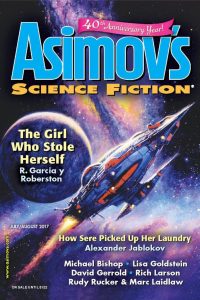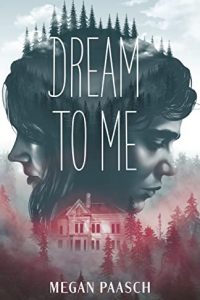Alex Brown Reviews The Lost Dreamer by Lizz Huerta
 The Lost Dreamer, Lizz Huerta (Farrar, Straus, Giroux 978-1-25075-485-1, $18.99, 384pp, hc) March 2022.
The Lost Dreamer, Lizz Huerta (Farrar, Straus, Giroux 978-1-25075-485-1, $18.99, 384pp, hc) March 2022.
Short fiction writer Lizz Huerta makes her young-adult novel debut with the sumptuous The Lost Dreamer. The first book in a planned duology, it tells the story of two young women in a fantasy world inspired by ancient Mesoamerica.
In the city of Alcanzeh live the Dreamers, women who can enter the Dream realm and commune with spirits. Dreamers advise the king and help protect the city, but when Indir loses her ability to Dream, her life is thrown into chaos. After the king dies, his cruel son forces his way onto the throne. Prince Alcan cares not for the traditions and spiritual practices of Alcanzeh. He craves power and intends to use the Dreamers to secure it. Indir and her final vision of the future become the focus of his unrelenting attention.
Somewhere far away lives Saya, a girl who can Dream but is not a Dreamer. Saya and her gift are under the tight control of her mother. Like Alcan, Saya’s mother Celay uses Saya’s communications with the spirits of the Dream for monetary gain and social capital. When Saya discovers the truth behind Celay’s lies, it gives her a way out of her mother’s abuse. However, her freedom is short-lived. Saya is part of a Story that was told long ago; she and Indir have crucial roles to play in the future of Alcanzeh, but first they must choose to let their Stories be told. As Indir and Saya’s Stories circle closer and closer, the consequences of their choices – and the choices made by others against their will – become more important and dangerous.
Although men have important parts to play, Huerta centers women in her story. Indir and Saya’s families are comprised solely of women, and women act as allies, confidants, and warriors throughout the book. Men are either in supportive roles or act as antagonists to Indir and Saya. However, the point is not that men are bad and women are good; the point is that the patriarchy destroys everything it touches.
Alcan and his fire warrior associates bring the patriarchy to Alcanzeh, and with it the end of everything Indir knows. He doesn’t just want power but subjugation. Even Saya is not spared its reach. Alcan’s corrupted version of a Dreamer, a nightmare of a man known only as the Pili, is tearing wounds in the Dream. If he finds Saya, it could be all over for her before her Story really begins. Indir has her own terrifying encounter with the Pili, and the ramifications of that interaction directly impact Saya.
The Lost Dreamer has a slower pace than the average young-adult second-world fantasy. Huerta takes the reader on a detailed yet gradual exploration of Indir and Saya’s world. We follow along as the girls savor delicious foods, witness strange sights, practice religious rituals, and discover new cultures. Huerta is in no hurry to explain or answer, choosing instead to revel in world building. This is a world that feels ancient and vast.
The setting sun was right in my eyes, a shining path of light splitting the ocean from horizon to shore. The sandy cliffs were soft as I descended past violet flowers that grew like long tongues from the crevices in the red earth. They moved as if licking the air as I passed, the Song calling to them. A hummingbird hovered near my face briefly, the setting sun reflecting a crescent moon of light in her yee. She chirped and sipped at an unfurling night blossom.
I read half this book in print and listened to the other half on audiobook, and highly recommend both. The lush descriptions are even more evocative in Elisa Melendez & Inés del Castillo’s immersive narration. Several times I sat in my parked car in front of my house, commute complete, listening to the last few minutes of a chapter because I wasn’t ready to turn it off.
In The Lost Dreamer, Lizz Huerta takes the reader on an epic journey, from the sacred city of Alcanzeh to the land of Dreams, from rural villages to magic boats, from past to present. This is a vibrant novel about the importance of tradition and the love of family. It’s the kind of story I felt grateful to have read. If Huerta keeps this up, she has a long and fruitful writing career ahead of her.
Alex Brown is a queer Black librarian and writer. They have written two books on the history of Napa County, California’s marginalized communities. They write about adult and young adult science fiction, fantasy, and horror as well as BIPOC history and librarianship. Diversity, equity, inclusion, and access set the foundation of all their work. Alex lives in Southern California with their pet rats and ever-increasing piles of books.
This review and more like it in the June 2022 issue of Locus.
 While you are here, please take a moment to support Locus with a one-time or recurring donation. We rely on reader donations to keep the magazine and site going, and would like to keep the site paywall free, but WE NEED YOUR FINANCIAL SUPPORT to continue quality coverage of the science fiction and fantasy field.
While you are here, please take a moment to support Locus with a one-time or recurring donation. We rely on reader donations to keep the magazine and site going, and would like to keep the site paywall free, but WE NEED YOUR FINANCIAL SUPPORT to continue quality coverage of the science fiction and fantasy field.
©Locus Magazine. Copyrighted material may not be republished without permission of LSFF.






